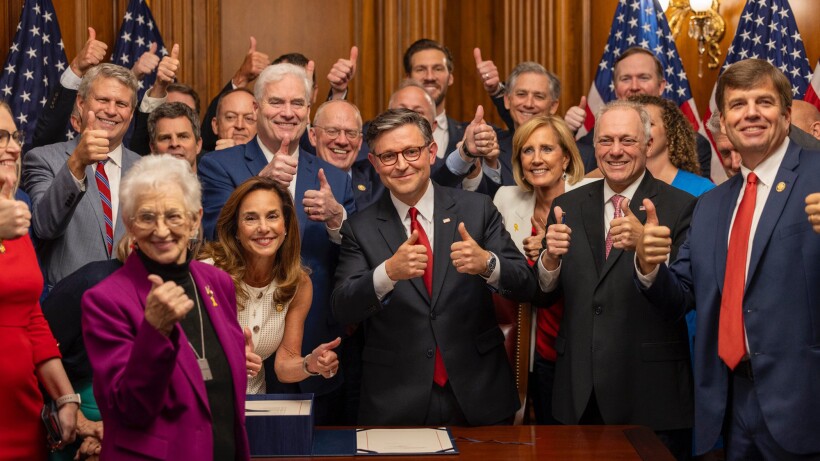Tax and Spending Megabill Boosts Private R&D, Defense, NASA

House Speaker Mike Johnson (R-LA) and other Republican representatives celebrate the passage of their reconciliation bill on Thursday, July 3, 2025.
House GOP
Republicans passed their reconciliation spending bill
The bill carries forward many provisions from the original House bill
The bill now goes to President Donald Trump’s desk to be signed into law. White House Press Secretary Karoline Leavitt told reporters
Tax rules for companies and higher ed
The final bill reintroduces tax rules allowing companies to fully deduct domestic research costs in the year they occurred. This reverses a rule introduced in the 2017 Tax Cuts and Jobs Act and in effect since 2022 that requires companies to spread the deduction of R&D costs over five years. The Joint Committee on Taxation estimated
The bill also modifies the current 1.4% endowment tax on the net investment income of some private colleges and universities, creating a tiered system that raises the rate to 8% for institutions with an endowment exceeding $2 million per student. The initial House proposal would have raised the rate to 21% for such institutions. JCT estimated the final bill will raise $761 million in government revenue over the next 10 years.
Rescissions of clean energy and climate funds
The bill rescinds unobligated funding from the Inflation Reduction Act from DOE’s Loan Programs Office and Advanced Industrial Facilities Deployment program, among others. It phases out
At the National Oceanic and Atmospheric Administration, the bill rescinds certain unobligated funds appropriated by the Inflation Reduction Act. The original appropriated amounts included $2.6 billion for climate resilience, $150 million for facilities, $150 million for forecasts, and $50 million for climate research, though it is unclear what proportion of the funds is unobligated.
Boosts for missile defense, nuclear weapons, and quantum
The bill includes nearly $25 billion for the “Golden Dome” missile defense shield proposed by President Trump in January, including $7.2 billion for the development and procurement of military space-based sensors, $5.6 billion to develop space-based and phase intercept capabilities, and $250 million to develop directed energy capabilities.
The bill also includes $250 million for the Defense Advanced Research Projects Agency’s Quantum Benchmarking Initiatives. The bill provides nearly $4 billion for the National Nuclear Security Administration, including $200 million for concept studies of new nuclear weapons, $1 billion to accelerate construction of facilities, $540 million for deferred maintenance, and $100 million to accelerate domestic uranium enrichment.
AI for science at DOE
The bill adds $115 million for NNSA to accelerate missions through AI and $150 million for DOE to take steps toward developing “self-improving artificial intelligence models for science and engineering,” mainly by cleaning and preprocessing scientific data for use in such models. The bill directs the national labs to partner with industry to curate the data. DOE launched its Frontiers in AI for Science, Security, and Technology initiative
The AI models will be provided to the research community via a cloud computing service called the “American science cloud” dedicated to scientific research, data sharing, and computational analysis. The bill notes two possible uses for the preprocessed data: rapidly developing next-generation microelectronics and discovering new energy technologies.
Other initiatives
Space: The bill provides nearly $10 billion for NASA programs, including funds for the Gateway lunar space station, Space Launch System rockets, and a telecommunications orbiter for use in a Mars Sample Return mission, all of which would be terminated under the president’s budget request.
Spectrum auctions: The bill also restores the Federal Communications Commission’s authority to auction spectrum
Icebreakers: The bill provides the Coast Guard with billions of dollars for acquiring new icebreakers, a type of ship that is used to resupply the National Science Foundation’s coastal base in Antarctica and conduct research in polar regions, among other missions.
Radiation exposure compensation: The bill also reauthorizes the Radiation Exposure Compensation Act and expands eligibility for those seeking compensation, including adding affected areas and modifying qualifying cancers. RECA, which expired
AI regulation: The Senate voted overwhelmingly Tuesday morning to remove language that would have put a 10-year moratorium on state regulation of AI. The proposal would have established a $500 million program for AI deployment that would only be available to states that opted in to the moratorium.
Agricultural research: The bill includes $37 million for the Foundation for Food and Agriculture Research and more than doubles annual mandatory funding for the Specialty Crop Research Initiative. The bill also provides $125 million each year for competitive grants to construct, acquire, or renovate agricultural research facilities.
This article has been updated to include estimates from the Joint Committee on Taxation of the final bill’s impact on government revenue.


